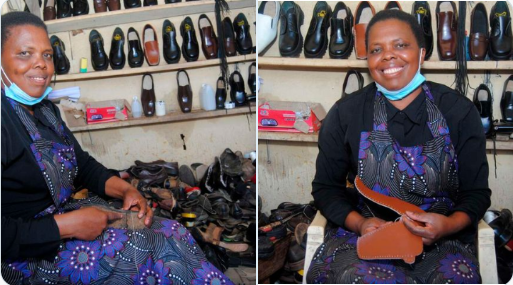Gladice Kerubo, a dedicated teacher with 13 years of experience, found herself at a crossroads when the 2007/2008 post-election violence disrupted her career path.
Forced to leave her teaching position at a primary school in Kapsabet, Nandi County, Kerubo embarked on an unexpected journey that would lead her from the classroom to the world of shoemaking.
In the midst of chaos, Kerubo sought refuge in Elburgon, Nakuru County, joining her husband, a skilled shoemaker.
The move was prompted by the need for safety during turbulent times, and little did she know that it would mark the beginning of a profound transformation in her professional life.
Initially, Kerubo’s husband managed a workshop in Elburgon, a trade he would later take to Nairobi. Left in the capable hands of her cousin Moses Arasa, a seasoned shoemaker, the workshop became Kerubo’s unexpected classroom for a new craft.
“I started watching my cousin at work, and I would ask him lots of questions regarding what I observed him do,” Kerubo shared.
Arasa, sensing that Kerubo’s curiosity was more than a passing interest, took it upon himself to become her mentor. He patiently answered her questions, guiding her through the intricate process of repairing and crafting shoes.
Within a remarkably short period, Kerubo evolved from a mere observer to a proficient shoemaker, demonstrating not only the ability to repair shoes but also to design and cut leather for new creations.
The transition from teacher to cobbler was not without its challenges, but Kerubo embraced the change wholeheartedly. Leaving behind the familiar world of education, she found solace in the art of crafting and the satisfaction of engaging one client at a time.
“In this business, I engage one client at a time, which is easier to manage compared to the big number of pupils I would attend to at any given time, not to mention the parents,” Kerubo explained, emphasizing the personalized connection she now enjoys with her customers.
Despite the drastic shift in her career, Kerubo harbors no regrets. The one-on-one interactions, creative freedom, and the tangible results of her work have become sources of fulfillment that surpass the challenges she faced as an educator.
Acknowledging the pivotal role her cousin played in her journey, Kerubo praised Arasa for being an excellent teacher and motivator. Their partnership in the workshop has become a testament to the collaborative spirit that fuels success in any profession.
The duo sources their materials from Nakuru and Nairobi, strategically opting for areas where prices are more affordable than their local market. However, Kerubo is keenly aware of the stereotypes that persist in her field, traditionally dominated by men.
“There are those who believe that this job is done by illiterate people. For instance, once, a client who had been accompanied by his child warned him that he would end up doing ‘dirty work’ like mine if he did not work hard in school,” she revealed, highlighting the societal misconceptions she occasionally encounters.

